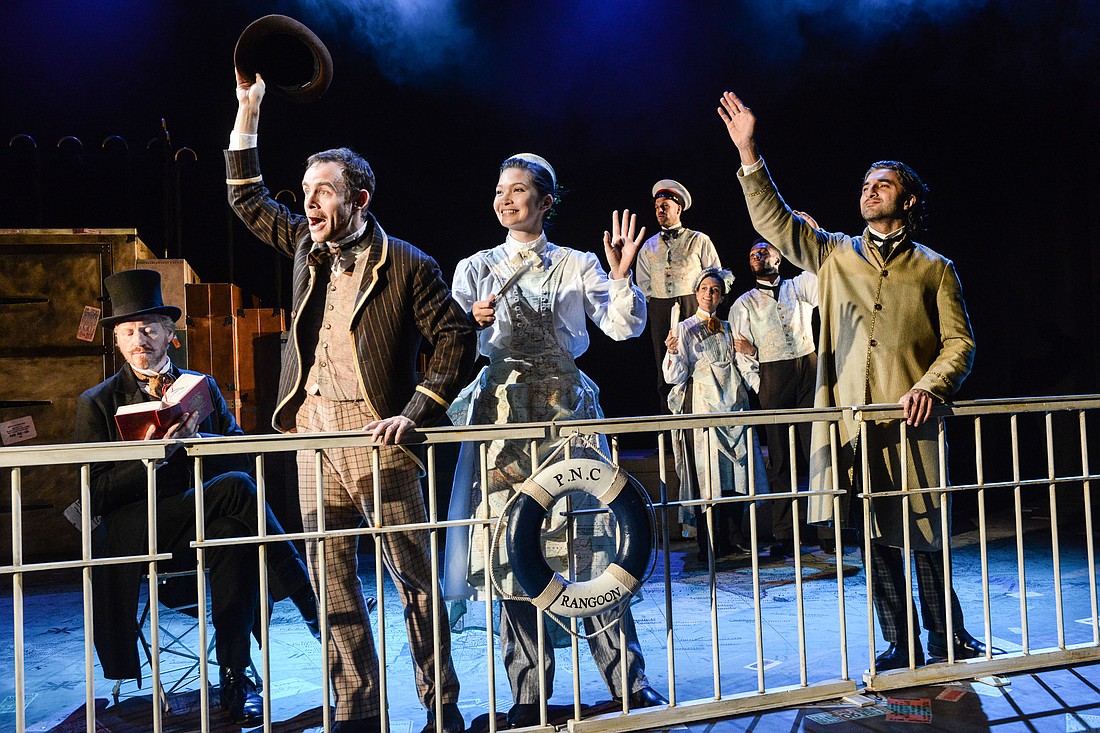- November 22, 2024
-
-
Loading

Loading

Jules Verne’s 1873 novel of a globe-trotting Englishman included a voyage by elephant, a rescued human sacrifice, a steamer voyage through a hurricane, a railroad journey across the Wild West and no balloon. This touring production by Kenny Wax Family Entertainment (the brains behind “Hetty Feather”) brings his odyssey to the Asolo Repertory Theatre audience with eight actors, a pyramid of steamer trunks, a few props and limitless imagination.
In case you haven’t read Verne’s novel, seen the 1956 movie, or the 2004 movie, here’s the plot. (Slightly modified from the original, as angry English majors might point out.)
In 1872, Phileas Fogg (Andrew Pollard), a ridiculously punctual wealthy English bachelor, is relaxing at his gentleman’s club in London. He opines that, considering advances in modern transportation, one might now travel around the world in 80 days or less. Derision ensues; a wager of 20,000 pounds is proposed. Fogg accepts the bet. He starts out that night, dragging Passepartout (Michael Hugo), his newly hired French manservant, with him. Although Fogg’s courage is great, his timing is bad. Somebody robbed the Bank of England that very same day and fled the country. Fix (Dennis Herdman) a feckless detective, fixates on Fogg as the culprit and chases after him. Without even trying, Fogg remains one step ahead of him. Over the course of 80 days, he also manages to rescue the Indian princess Aouda (Kirsten Foster) from a suttee, rescue Passepartout from bad guys in the Wild West, circumnavigate the globe, and (despite some confusion over the International Dateline) beat the clock and win the bet.
Laura Eason’s clever adaptation uses Verne’s plot as a springboard for leaps of invention, cheeky improv and brilliant bits of business. Fogg pretends to toss a passport to Passepartout across the stage. His manservant (with clever sleight of hand) pretends to catch it. Actors oscillate to indicate the swaying of boats and trains. A strategically tied coat becomes an elephant. There’s also acrobatics, hand-walking and cartoony martial arts. It’s like Cirque de Soleil with a plot.
Eason’s adaptation has a joyful, childlike spirit of “Let’s pretend.” Director Theresa Heskins honors that spirit with fast-paced invention and a sense of play. A handful of amazingly talented actors make it work.
Pollard’s Fogg is the story’s designated straight man. The play revolves around him, but fun is not his style. He travels the world with his head in an almanac and misses the scenery. Hugo’s Passepartout, on the other hand, is a scene-stealer. In this adaptation, he’s a master of both circus arts and martial arts. Along with flaunting his acrobatic skills, his character plays the mandolin and riffs with the audience. Hugo’s a great comedian on several levels. Like Inspector Clouseau, Herdman’s Fix is a lousy detective who thinks he’s a great one. (He’s even worse than Clouseau, because his heart’s in the wrong place.) Foster’s Aouda defies the rescued princess trope. While she’s happy to avoid immolation, she’s equally happy pointing out the arrogance of colonialism. Pushpinder Chani, Matthew Ganley, Nyron Levy and Joey Parsad round out the multinational, multilingual cast. Together, they embody more than 100 characters.
Lis Evans’ set is essence of less-is-more. There’s no attempt at realism. To create the world of this play, you have to put your imagination to work. Her splashy quick-change costumes have the same effect.
Movement director Beverley Norris-Edmunds is particularly outstanding in the cartoony combat scenes. Passepartout mimes the Kung Fu fighting, pretending to pummel his opponents across the stage without making physical contact. It’s a brilliant way to indicate action without darkening mood. James Atherton’s score sets the right travelogue note. (If it’s sitars, this must be India.) The expressionistic power of Alexandra Stafford’s lighting and James Earls-Davis’ sound design completes the dream. The combined effect of all this stagecraft is cinematic — like watching a movie of the mind.
Verne’s simple story holds up under the clever dramaturgy. Phileas Fogg circles the globe, wins a bet, and finds himself. He starts out a clockwork man and discovers he has a heart by journey’s end. Fogg wins the heart of Aouda in the process. What’s not to like?
It’s a kid-friendly show, but childlike, not childish. Adults won’t be bored. Children won’t be terrified. Everybody wins.
The long, strange trip of Phileas Fogg is well-worth taking.